- Home
- Peter S. Beagle
The Unicorn Anthology.indb Page 20
The Unicorn Anthology.indb Read online
Page 20
Siddens was right. It was as if there were a force field around Troy. Even the mosquitoes and leeches stayed off him. When he and some other grunts from the platoon spent an R&R polishing their peckers in a Saigon whore-house, Troy was the only one who didn’t need a shot of penicillin afterward.
Troy began leaving his shirt off, or at least unbuttoned, as often as possible, until he realized his tan was obscuring the tattoo, then he covered up again. He began to smile and make jokes. He even volunteered to be point man on patrols. At first the lieutenant let him, but later shitcanned the idea: Troy wasn’t cautious enough.
Then, as the summer of ’67 dribbled into late autumn, the North Vietnamese began to get serious about the war. Suddenly the enemy’s presence meant more than an occasional sniper, a punji pit, or a land mine in the road. It meant assaulting fortified bunkers in the face of bullets and heavy artillery.
As the whole Second Battalion was swept into the midst of the firefight in the hills surrounding Dak To, Troy huddled in a foxhole, trying to banish the noise of the bombs from his consciousness. A 500-pounder from a U.S. plane had accidentally wasted thirty paratroopers over on Hill 875—“friendly fire”—trying to dislodge the NVA from their hilltop fortifications. A brown, sticky mass stained the crotch of his fatigue pants—it had been there for hours. Hunger gnawed at his stomach—no resupply had been able to reach them for two days. Over and over he repeated the words Siddens had told him: “Don’t worry. You got the magic.”
He so needed to believe.
Dusk was falling. Staff Sgt. Morris passed a hand signal back. The platoon was going to advance.
A cacophony of machine guns and grenades filtered through the vegetation ahead. Somewhere, other elements of the battalion needed help. Troy gripped his rifle tightly as he rose from his foxhole. Crouching, he joined Holcomb and Siddens. They sprinted forward a bit at a time, heading for the base of the next large tree.
Troy was consumed by the urge to shut his eyes and clap his hands to his ears. No sooner had he done so than the ground erupted in front of him. Blinking, ears ringing, he realized only after the fact what he had sensed.
“Incoming!” he shouted.
His yell came too late. The smoking crater was already there. He was covered with specks of heavy, red laterite clay. He whirled to his right. There, still upright, stood the pelvis and legs of Doug Siddens. The medic’s upper body lay somewhere in the brush.
Troy spun to his left. Leroy Holcomb was trying to scoop his intestines back into his abdomen with his remaining arm. Troy caught him just as he fell. His buddy let out a sigh and went limp, his blood and life soaking into the ruptured soil. He didn’t even have time to utter a last sentence.
Troy cradled Holcomb’s head in his lap. Sgt. Morris was yelling—probably something about retreating to the holes—but the words sailed right past. Troy examined his arms, his legs, his torso. Not a single cut. He had been the closest man to the explosion, and all it had done to him was get him dirty.
“Who’d have thought those gooks could whup our asses like this?” muttered Warren Nance, the radio telephone operator.
Troy raised his finger to his lips. The RTO should not have been talking. The jungle was fearsomely still, but that did not guarantee that the enemy had all fled.
The Battle of Dak To had ended suddenly. One moment the NVA were there, blasting with everything they had; the next moment they had melted into the earth, leaving the clean-up to the Americans. At present, Troy and the other survivors were scouring the jungle for the wounded and dead, a gory process that a Special Forces sharpshooter at the base camp had called, “Shaking the trees for dog tags” due to the unidentifiability of some of the remains.
After the adrenaline overdose of the past week, the quiet did not seem real to Troy. Coherent thought was impossible. He still touched himself here and there, confirming that no pieces were missing. He felt no victory, no elation, no horror, no fear. All he knew is that he was here. The only emotion he was sure of was relief: What was left of Siddens and Holcomb had been zipped into body bags and shipped off. The KIA Travel Bureau was the wrong way to leave Vietnam, but at least he knew they were no longer rotting on the ground a million miles from home.
Why them? were the words rolling over and over through his mind. Why them and not me?
Whenever he considered the question, his hand rose up and scratched the left side of his chest. Sometimes it almost felt as if the unicorn were rearing and stamping its feet. Today the impression was stronger than ever.
They came to a gully containing the body of a dead U.S. soldier, lying on his side. Flies crawled from his mouth and danced above the gaping wound in his back. As Nance bent to roll the corpse flat to check the tags, Sgt. Morris grabbed him by the radio and hauled him back two steps. “Hold it!” he hissed.
Morris knelt down, shifted a few leaves next to the front of the dead man, and uncovered a trip wire. “It’s booby-trapped.”
“Damn,” Nance said. “Sure saved my ass, Sarge.”
A burst from an AK-47 blistered the foliage around them. Nance jerked and fell.
“Down!” Morris yelled.
The squad hit the ground. Instantly half a dozen men trained their weapons in the direction from which the attack had come and began emptying their clips as fast as they could without melting their gun barrels.
Troy knew the bullets would continue to fly for minutes yet, even longer if the sniper were stupid enough to shoot back rather than play phantom. Meanwhile Nance was lying next to him, choking. A slug had torn through the back of the RTO’s mouth.
What do I do? Troy thought. Nance was dying, and they had no medic; Siddens had not yet been replaced.
Troy’s tattoo quivered violently. Abruptly the knowledge he needed came to him. He confirmed Nance’s upper breathing passage was too damaged to be cleared. Surgeons would have to do that after the medevacs airlifted the wounded man to a field hospital.
Nance’s skin was turning blue. Troy pulled out his knife, located the correct notch near his buddy’s Adam’s apple, and sliced. Holding the gash open with his finger, Troy nodded in satisfaction as air poured directly into Nance’s trachea. The rto’s lungs filled.
The panic in Nance’s pupils faded to mere terror. Sgt. Morris managed to get to the radio on Nance’s back and used it to request a chopper. Troy sighed. His buddy would live.
And then, with brutal suddenness, he understood why he had felt so certain of a medical procedure he had never before attempted. A presence was hovering inside him. He had been aware of the sensation for days, whenever the tattoo stirred, but he had not realized what it was. All he had known was that, from time to time, he felt as though he were looking at the world with different eyes.
The presence was not always the same. There were two entities. The visits had begun the night Siddens and Holcomb had died.
His buddies had not left him, after all.
1972
Specks of red Georgia clay marred the knees of Troy’s baseball uniform. He bent down and brushed with his hands, but the dirt clung. With an abruptness just short of frantic, he tried again.
“Chesley!” The booming voice came from the rotund, middle-aged man near the dugout. “Where do you think you are? Vietnam? Pitch the damn ball already!”
“Sorry, Angus,” Troy called, straightening up.
Troy had made the mistake a few days back of telling Angus that a lapse of attention had been caused by thinking of the war. Now the old fart accused him of more of the same any chance he could.
Troy shrugged off both the insult and the distraction that had provoked it. The ball was cool and dry in his hand, a tool he knew how to use. He wound up and let fly. The batter, suckered by Troy’s body language, swung high and missed. Strike two.
Angus nodded. That was the kind of quality he expected of a prospective pitcher. Troy tipped his cap at the talent scout. Everything under control.
Troy had been thinking of Vietnam, though. Specific
ally of a buddy named Arturo Rivas with whom he had served during his second tour.
“When I get out of this puto country, I’m going to do nothing but play baseball,” Rivas said, huddling under a tarp. Thanks to the monsoons, the platoon hadn’t breathed dry air in four days.
Troy noted his companion’s ropy muscles and gracile hands and, with a friendliness borrowed from Leroy Holcomb, said, “You mean as a pro, don’t you?”
Rivas shrugged and smiled. “Why not? My uncle, he played in the minors for five years, and I’m better than him.” He winked, full of young man’s bluster. Troy could tell he believed what he said.
“I want to see you get there,” Troy responded with sincerity.
That was five weeks before Rivas lost three vertebrae and too many internal organs in a nameless village in the Central Highlands. He had been the las tone. First Siddens and Holcomb, then Artie Farina, Stewart Hutchison, Dennis Short, and Jimmy Wyckoff. Seven men dead from bullets, mortar rounds, and claymores that could have, should have killed Troy.
Dirt on his pants. He could wash a million times, and never lose the traces of those men.
Troy wound up, reading the batter’s desire for another sinker like the last one. Troy laid it in straight and fast. Strike three.
“I want to see you get there.” When Troy had made that comment, it had been intended merely as polite encouragement, but it had since gone beyond that. Arturo was with him. He guided Troy’s arm through its moves, told him what the batters might be thinking, gave him speed when he ran around the bases. He was the one Angus was impressed with, the one the scout might reward with a contract.
The tattoo itched. No, Troy thought. Not now. But his wishes were ignored. The mindset of a pitcher vanished. Arturo had phased out. He was Troy Chesley again—an indifferent athlete with no real knack for baseball.
The new batter was waiting. Troy hesitated, drawing another of Angus’s infamous glares. No choice but to pitch and hope for the best. He flung the ball toward the plate.
The gleam in the batter’s eye said it all even before he swung. The crack of wood against leather echoed from one side of the stadium to the other. The ball easily cleared the left field fence.
The next few pitches were not much better. The batter let two go by wide and outside, then with a whack claimed a standing double. Luckily the player after that popped out to center field, sparing Troy any more humiliation.
That ended the three-inning mini-game. Angus and his assistants reconfigured the players into a brand new Team A and Team B. Troy waited by the dugout for his assignment, but it didn’t come. As the other aspiring pros hit the turf or loosened their batting arms, Angus pulled Troy aside.
The scout spat a brown river of tobacco juice onto the ground. “I know you don’t want to hear this,” he said gruffly. “You’ve got talent, Chesley, but no consistency. One moment you’re hot, the next you’re a meathead. Until you can keep yourself in the groove, you might as well forget about this camp. Put in some time on your own, get the kinks out, and maybe I’ll see you here next year.”
Angus turned back to the diamond. His posture said that as far as he was concerned, Troy no longer existed.
Troy slapped the dust from his mitt and trudged into the locker room. Next year? Next year would be no different. No matter how hard he tried to keep Arturo Rivas at the forefront, sooner or later he, Troy, would reemerge—he or one of the other six.
He was living a total of eight lives. Out there on the diamond, he had been Arturo, as intended. This morning while shaving Artie Farina had surfaced, and he had whistled a tune learned during a boyhood in Brooklyn, three thousand miles from where Troy Chesley had grown up. At least he thought it was Artie. Sometimes there was no way to really know. He simply was one guy or another, without any sort of command over the phenomenon, his only clue to the transition consisting of an itch or warmth or tingle in the area of his tattoo.
He opened his locker, took out his kit bag, and began shoving items within, changing out of his togs as he went. No shower. He wanted out of this place. Already he knew what he would feel the next time Arturo emerged—the shame, the disappointment, the anger. The ambient stink of sweat and anti-fungal powder attacked Troy’s nostrils, making him crave clean air.
“I’m sorry,” Troy whispered. “I tried.”
How he had tried. This time with baseball, for Arturo. Last year in pre-med courses, aiming for the M.D. that Doug Siddens had wanted. In his biochemistry class he had sailed through the midterm, propelled by the mental faculties of a man determined to learn whatever was required to become a doctor. On the final, the unicorn remained as flat and dull as plain ink, and as mere Troy Chesley he scored a dismal thirty-two percent, killing his chance of a passing grade.
As he peeled away his shirt, the tattoo was framed in the small mirror he had mounted on the inside of his locker door. He touched it, as ever feeling as though, no matter how much it was under his skin, it wasn’t truly part of him.
A good luck charm? Oh, he’d survived all right. Through the war without a scratch. He had all the life and youth he could ever have imagined. Seven extra doses. But as usual, the rearing shape gave him no clue what he was supposed to do with so much abundance.
1975
Troy’s dented Pontiac Bonneville carried him out of New Orleans, across the Pontchartrain Causeway, through the counties of St. Tammany and Washington, and over the boundary into southern Mississippi. As he drove along country roads beside trees draped with Spanish moss and parasitic masses of kudzu, the sense of familiarity grew ever more intense, though he had never been to this part of the South.
He unerringly selected the correct turns, having no need to consult his map. His destination appeared through the windshield. Hardly a town at all, it was one of those impoverished, former whistlestop communities destined to vanish into the woods as more and more of its young men and women migrated to the cities with each generation. By all rights he should never have recalled the place name; it had been mentioned in his presence no more than twice, all those years ago.
There were two cemeteries, the first dotted with old family mausoleums and elaborate tombstones—a forest of marble. He went straight to the second, a modest but carefully maintained site overlooking a river. The caretaker stared at him as if he had never seen a white man on the grounds before, but he was polite as he directed Troy to the graves belonging to the Holcomb family.
Leroy’s resting place was easy to find. Eight years of weather had not been enough to mute the engraving of the granite marker. A few wilted flowers lay in the cup. He lifted them to his nose, catching vestiges of aroma. Not yet a week old. After eight years, someone still remembered this particular dead man. That brought a tightness to his throat.
He had a fresh bouquet with him, but he placed it at the head of a nearby grave marked Lionel Holcomb, 1919-1962.
“Rest in peace, Daddy,” he whispered.
A woodpecker hammered in the oak tree on the river side of the graveyard. The air thrummed with an invisible chorus of insects that could never survive in the San Francisco Bay Area, where Troy had been raised. Seldom had he felt anything so real as the smell of the grass at his feet or the humidity sucking at his pores.
He turned and walked determinedly back to his car and drove into town. A block past the Baptist church, he pulled up at a house. The clapboard was peeling, but the lawn was mowed and the roof had been recently patched, showing that while no rich folk lived here, the occupants cared about the property.
Troy stepped up onto the porch. The urge to rush inside was next to overwhelming, but he stifled it. The body he inhabited was the wrong color, the wrong size. No matter what, part of him was always Troy Chesley, even when he didn’t want it to be so. He knocked politely.
A stout Black woman in a flower-print dress opened the inner door and stared at him through the screen mesh, her eyes widening at his stranger’s face.
Mama! I love you, Mama! Troy forced down the words
in his mind and uttered the pale substitutions circumstances allowed. “Mrs. Holcomb?”
“That’s me,” she said.
I missed you, Mama. “My name is Troy Chesley. I served with your son Leroy in the war.”
The woman lifted her bifocals out of the way and wiped her eyes. “Leroy,” she said huskily. “He was my first-born, you know. Hard on an old widow to lose a son like that. What can I do for you, child?”
“I have a few questions, Ma’am. I was wondering . . . what kind of plans Leroy had? What he wanted to do with his life? What do you think he’d be doing right now, if he’d come back from over there?”
She shook her graying head firmly. “Now what you want to go asking me those kinds of things for? All that will just remind me he ain’t here. The war is over, Mr. Chesley. Go on about your business and don’t bother me no mo’.” She shut the door.
“But—” Troy raised his hand to protest, but blank wood confronted him. You don’t understand, Mama. Troy’s got all my chances.
“I’ve got everybody’s chances,” he murmured as he turned, shoulders drooping, and stumbled back to his Pontiac.
1978
The bathroom mirror showed Troy a twenty-one-year-old self. No traces of the beer belly or the receding hairline his younger brother was developing. No need for the corrective lenses his sister had required when she reached twenty-five. His greet-the-day erection stood stiff as a recruit being screamed at by a drill sergeant: A kid’s boner, there even when all he wanted to do was take a piss.
He was aging eight times slower than normal. He was thirty now, a point when other two-tour vets often looked forty-five. At least he was aging. That proved he wasn’t literally immortal. Just as he wasn’t totally invulnerable, or the razor wouldn’t have nicked him the day before. He didn’t think he could bear it if the tattoo didn’t have some limits.
He showered, dried, and drifted into the living room/ kitchenette wearing only a pair of briefs—the summer sun was already high, and the apartment had no air-conditioning. Slicing an apple and eating it a sliver at a time filled the next three minutes. The clock above the stove ticked: The heartbeat of the room.

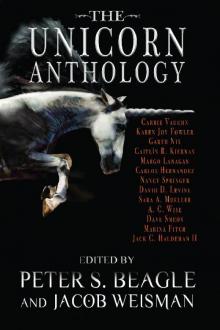 The Unicorn Anthology.indb
The Unicorn Anthology.indb Sleight of Hand
Sleight of Hand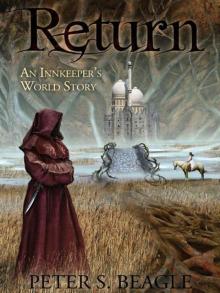 Return
Return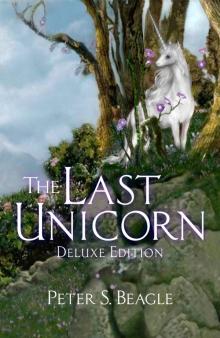 The Last Unicorn
The Last Unicorn Two Hearts
Two Hearts Mirror Kingdoms: The Best of Peter S. Beagle
Mirror Kingdoms: The Best of Peter S. Beagle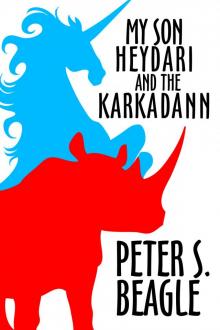 My Son Heydari and the Karkadann
My Son Heydari and the Karkadann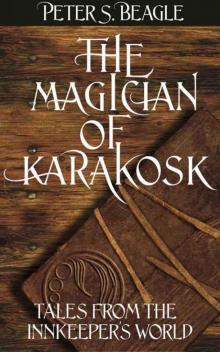 The Magician of Karakosk, and Other Stories
The Magician of Karakosk, and Other Stories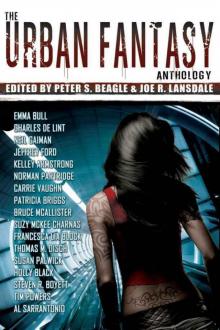 The Urban Fantasy Anthology
The Urban Fantasy Anthology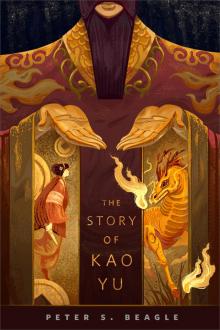 The Story of Kao Yu
The Story of Kao Yu The Karkadann Triangle
The Karkadann Triangle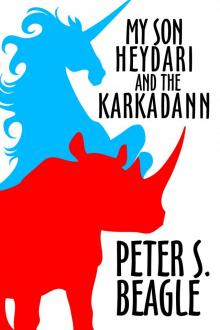 My Son and the Karkadann
My Son and the Karkadann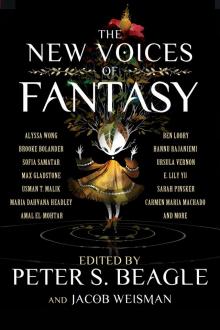 The New Voices of Fantasy
The New Voices of Fantasy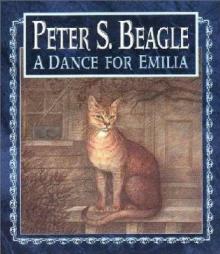 A Dance for Emilia
A Dance for Emilia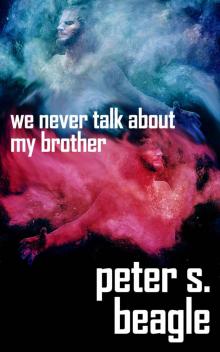 We Never Talk About My Brother
We Never Talk About My Brother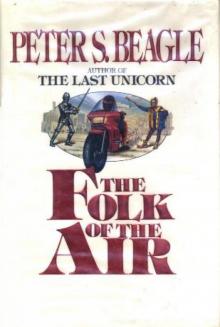 The Folk Of The Air
The Folk Of The Air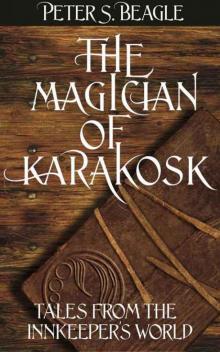 The Magician of Karakosk: Tales from the Innkeeper's World
The Magician of Karakosk: Tales from the Innkeeper's World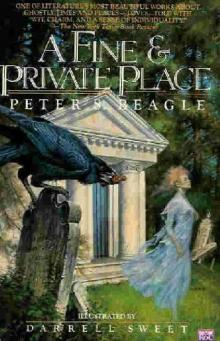 A Fine and Private Place
A Fine and Private Place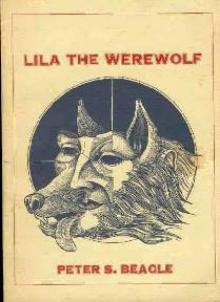 Lila The Werewolf
Lila The Werewolf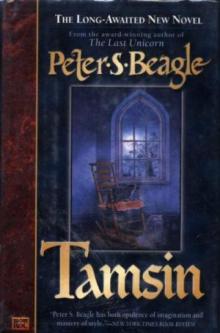 Tamsin
Tamsin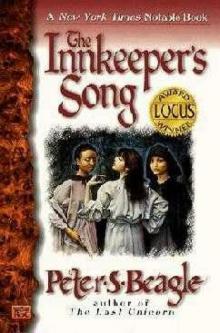 Innkeeper's Song
Innkeeper's Song